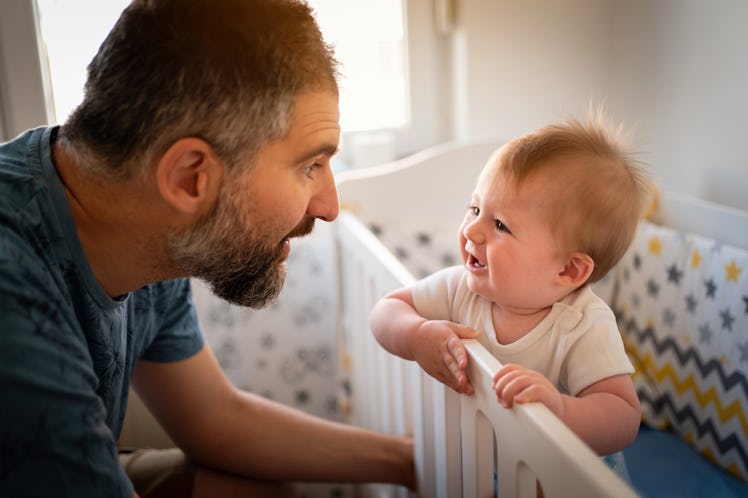How to Wake Up a Toddler the Right Way (Without a Children’s Alarm Clock)
Parents don't need a special wake-up alarm to make kids bright-eyed and bushy-tailed — but they may have to become morning people themselves.

After figuring out how to put a baby to sleep, which is by no means a simple process, a parent’s next task is to devise a strategy for waking kids up. Make no mistake, mornings are easier than evenings, but that doesn’t mean that a gentle shake is gonna get it done. The way a toddler wakes up can weigh heavily on their willingness to tackle the day with a positive attitude, which in turn influences the way they learn and develop. It’s actually an important process to really consider. Ditching the alarm clock for a song and a smile goes a long way.
Wake Up a Toddler With a Good Attitude
First, the good (and frustrating) news: A well-rested parent is the best possible alarm. That said, a well-rested parent is also an oxymoron so it’s fine to fake it. Just put on a cheery voice and say good morning. That simple gesture can make a big difference — and yield dividends for the rest of the day.
“I always tell parents that might mean waking up 20 minutes earlier to make sure that you are ready to provide whatever support your child needs,” explains licensed psychologist Dr. Roseanne Lesack, director of the child psychology clinic at Nova Southeastern University. That might seem like a big ask, particularly if kids are still getting up at night, but it’s worth it for a smooth, stress-free transition into the day. Twenty minutes might mean the difference between a groggy shouting match and the second cup of coffee that puts a parent right.
To make the morning even better, Lesack suggests parents consider working ahead. “Think of whatever you can get prepared ahead of time,” she says. “Whatever you can get done the night before, get it done.” Those tasks might include asking a kid to pick out their clothes and decide what they want to eat for breakfast. It might even include packing a lunch and getting a backpack ready during the school year. Any little bit helps.
“When they’re in a grumpy mood it’s really hard to make decisions,” Lesack explains. “So when those decisions about what they want to wear and what’s for breakfast have already been made, there’s no conversations about that.”
Tips For Helping a Toddler Wake Up Easily
- Wake up early so that you’re ready to wake your kid up with a good attitude.
- Prepare the night before to take tricky decisions and time-consuming tasks off your plate.
- Try to use the gradual natural light while waking a kid.
- Sing a song or play gentle music to help improve mood.
- Have realistic expectations for how long it will take a child to wake up.
Lesak also recommends parents have realistic expectations about how much time a child needs to get going. A hurried kid will be a dazed and tender kid. Parents should make sure that there is enough time to get everything done while allowing for a gentle entry into the day. There should be time enough to let natural light in slowly. A minute or two should be set aside for a wake-up song or some music and perhaps even a cuddle.
All of this can be woven into a morning schedule. It’s all dependent on what the kid needs, according to Lesack. “Know your child and stick with the schedule as best you can,” she says. But not so much that the routine is easily derailed. “We need to flexibly structured because every morning is going to throw something new at you.”
But in the end, Lesack is unequivocal about the fact that a parents attitude about the morning will be reflected in their child. If a parent wakes up frazzled, behind and angry, then they shouldn’t expect any better from their kid. Again, that doesn’t mean becoming a morning person overnight. Rather, parents should give themselves enough time to have the presence of a morning person by the time the wake up their child.
“They will feed off of you,” Lesack says. “When you’re present with your child, be present. Help and focus as much as you can.”
This article was originally published on